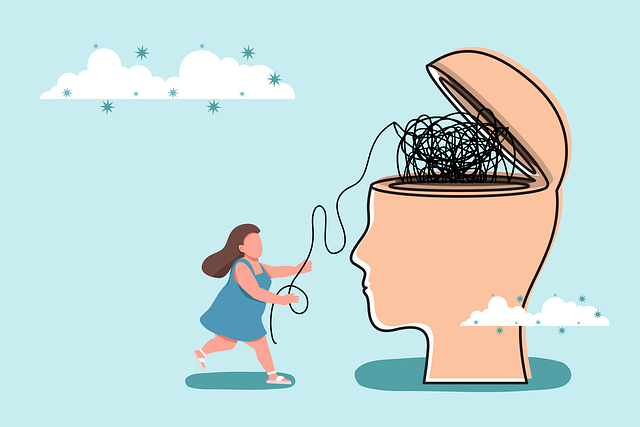The Stress Management Workshops Organization offers evidence-based solutions through Littleton Somatic Experiencing (LSE) therapy, combining positive thinking with practical stress reduction. This holistic approach creates safe spaces for participants to explore emotions and develop personalized resilience strategies. Interactive workshops use LSE techniques to release trapped emotions, improve mental wellness, and resolve interpersonal conflicts. Success is measured via participant feedback, self-reported stress level improvements, and adoption of taught techniques, with resources like online support groups encouraging lasting behavioral changes. Cultural sensitivity ensures a respectful environment for all.
Stress management workshops have become essential tools for promoting well-being. This article explores a structured approach to organizing such workshops, focusing on the profound impact of stress on daily life and mental health. We delve into the integration of Littleton Somatic Experiencing (LSE) therapy, a proven technique, to design immersive experiences. By creating safe spaces and employing interactive strategies, participants can effectively manage stress. Furthermore, we discuss measurement tools and techniques to encourage ongoing practice, ensuring lasting positive changes.
- Understanding Stress and Its Impact on Well-being
- The Role of Littleton Somatic Experiencing Therapy in Workshop Design
- Creating a Safe and Supportive Workshop Environment
- Interactive Techniques for Effective Stress Management
- Measuring Success and Encouraging Continued Practice
Understanding Stress and Its Impact on Well-being

Stress is a natural response to life’s challenges, but when left unaddressed, it can have profound effects on both mental and physical well-being. Understanding stress on a deeper level is crucial for effective management. Stress Management Workshops Organization aims to shed light on this intricate topic, drawing from evidence-based practices like Littleton Somatic Experiencing Therapy (SE). This approach focuses on the body’s inherent ability to heal and regulate itself, offering a holistic perspective that goes beyond mere mental coping strategies.
By recognizing the impact of chronic stress on various systems within our bodies, individuals can cultivate healthier responses. These workshops empower participants with tools to assess their personal stress triggers and develop personalized strategies for resilience. Incorporating positive thinking techniques alongside practical stress reduction methods creates a comprehensive framework, enabling attendees to navigate life’s pressures with greater equilibrium and improved mental health.
The Role of Littleton Somatic Experiencing Therapy in Workshop Design

The design of stress management workshops benefits immensely from incorporating Littleton Somatic Experiencing (LSE) therapy techniques. LSE offers a unique approach to processing and releasing traumatic memories, which can significantly enhance the workshop’s effectiveness. By combining LSE with traditional mental health awareness practices, these workshops provide participants with powerful tools for managing stress and overcoming challenges.
This holistic method goes beyond simple mindfulness meditation or crisis intervention guidance. It encourages individuals to explore and resolve deep-seated emotional responses, fostering a more profound sense of calm and resilience. The integration of LSE into workshop design ensures that attendees gain practical skills for navigating stressful situations while also addressing the root causes of their distress, leading to lasting positive change.
Creating a Safe and Supportive Workshop Environment

Creating a safe and supportive workshop environment is paramount to effective stress management. At our Littleton Somatic Experiencing Therapy workshops, we prioritize fostering an atmosphere where participants feel comfortable exploring their emotions and implementing Mind Over Matter Principles. This involves setting clear boundaries, ensuring confidentiality, and encouraging active participation through open dialogue. Our facilitators are trained to create a non-judgmental space that promotes resilience building, allowing individuals to develop self-care routines tailored for better mental health.
Through experiential exercises and collaborative discussions, we help attendees cultivate coping strategies that resonate with their unique needs. By integrating these practices into daily life, participants can enhance their ability to navigate stress, promote emotional well-being, and cultivate a profound sense of inner peace.
Interactive Techniques for Effective Stress Management

Stress management workshops can be highly effective when incorporating interactive techniques that engage participants actively in their own stress relief journey. One such approach is Littleton Somatic Experiencing Therapy, which focuses on helping individuals process and release trapped emotions. Through guided exercises, participants learn to identify physical sensations associated with stress and use these as guides for deep relaxation and healing. This method not only reduces immediate stress levels but also provides long-lasting coping mechanisms.
Additionally, conflict resolution techniques play a crucial role in managing stress related to interpersonal interactions. Workshops can teach practical strategies for effective communication, active listening, and empathy, empowering individuals to navigate challenging situations with composure. By addressing underlying tensions and fostering healthier relationships, these skills contribute to overall mental wellness and prevent burnout.
Measuring Success and Encouraging Continued Practice

Measuring success is a critical component of any workshop, especially those focused on sensitive topics like stress management and mental wellness. The organization hosting these sessions should establish clear, measurable outcomes to evaluate the effectiveness of the program. This could include participant feedback forms, tracking improvements in self-reported stress levels, or even the implementation of specific techniques taught during the workshops. For instance, the successful integration of Littleton Somatic Experiencing Therapy (SE) methods into participants’ lives can be a significant metric, showcasing the long-term impact of the program.
Encouraging continued practice is key to fostering lasting behavioral changes and maintaining mental wellness. Workshop organizers can promote this by providing resources such as online support groups, follow-up coaching sessions, or even suggesting specific exercises tailored to individual needs. Incorporating cultural sensitivity in mental healthcare practices is essential during these continuance efforts, ensuring that all participants feel respected and supported, regardless of their background. The development of Mental Wellness Coaching Programs can further enhance this process, offering personalized guidance for each participant’s unique journey towards stress management.
Stress management workshops, designed with an emphasis on Littleton Somatic Experiencing Therapy (LSE), offer a transformative path towards improved well-being. By creating safe spaces and employing interactive techniques, participants can effectively navigate and manage stress. The success of these workshops lies in their ability to empower individuals with practical tools, fostering a sense of resilience and ongoing self-care practices. This holistic approach, inspired by LSE principles, ensures that attendees leave equipped to handle life’s challenges with greater ease and balance.














